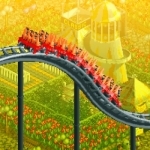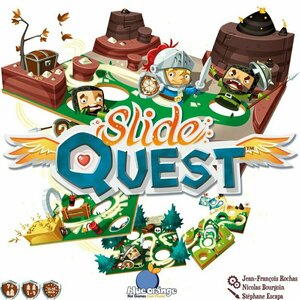
Weather Live.
Weather and Travel
App
Don't let bad weather take you by surprise! Whether it is cloudy, raining, snowing or even stormy...
Purple Phoenix Games (2266 KP) rated Slide Quest in Tabletop Games
Jun 8, 2021
Ok so I originally heard about this game from watching one of Marco Arnaudo’s GENCON videos (he’s amazing btw and you should watch every video) and immediately falling in love with the premise. In this game it is your charge as a player to help the little blue knight guy, I’ll call him Sir Rolli, travel from Point A to Point B. That’s it! That’s all you have to do! However, there are obstacles in your path – fences, rocks, archways, dynamite, and even nefarious foes – foeeples. You do this by pressing down yellow levers that flip up one of the four sides of the game board. This then send Sir Rolli along the opposite direction, and depending on the pressure used, possibly right into a fence, or worse – a hole in the ground!
There are several modes of play and ways you can play. With different numbers of players you will have varied experiences. For instance, the first time I played this was with my son, 3, and my father-in-law, 60+. Now, my son obviously is in it to inadvertently sow mayhem, so my F-I-L and I had to compensate as much as possible. Even then, I loved playing it. The next time I played this was with three other players of adulthood status. Our experience was more focused, and we just tore through the different level with a surprising amount of success. We did not complete all 20 included levels, but we got close! Everyone who played had a great time, and we were all smiles the entire time.
This doesn’t mean that it is a perfect game. Nay. For this game can suffer an extreme quarterbacking issue. You know the type – (s)he who believes they know best in every situation and therefore feels compelled to tell everyone else what to do or how to do it correctly? Yes, even I succumb to this affliction at times, but I believe I have a great handle on it, personally. In any case, quarterbackers can also be shut down very quickly when they neglect to operate their paddle correctly and thus allow the team to suffer a lost health. It can happen, and that’s why I am placing that caveat here and now. Luckily, I have not experienced that in any of our games, so I hope that continues.
Components. I don’t know what happened over at Blue Orange Games over the last several years, but for the company that was known (at least in my world) as the “Spot It” company, and nothing more, they sure have upped their game (har har) significantly. These components are FANTASTIC and they really complement a fun and engaging game experience. Everything has a place, and the quality and art style are just through the roof. To me, well worth the price tag for the components alone.
So all in all, I absolutely adore this one. It is cute, fast, an easy teach, and can be a great equalizer as you can play with an array of different teammates. Josh has waffled on his rating for this one, but we all very much love this little gem. For the reasons mentioned and the fact that Josh added this to his cart and checked out before I was even done setting up the first map, Purple Phoenix Games give this one a slip-slidey 22 / 24. Go get this now!
Sarah (7800 KP) rated The Terminator (1984) in Movies
Jan 27, 2021
The Terminator is a sci-fi classic and is responsible not only for helping propel Arnold Schwarzenegger and James Cameron to the household names they are now, but also for creating a movie franchise that is still going nearly 40 years later. Although admittedly the majority of the sequels are better off never spoken about again.
Released in 1984 and bringing director James Cameron into recognition, The Terminator follows a cyborg assassin (Arnold Schwarzenegger) who is sent back in time to kill Sarah Connor (Linda Hamilton), to prevent her son John Connor from saving humanity in the future. Also sent back in time to try and save Sarah is human soldier Kyle Reese (Michael Biehn).
This is a story that must be familiar to most, having spawned a further 5 sequels (and counting) in the past 30+ years. And as sci-fi stories go, this is a damn good one – time travel, murder, even romance – it has it all. It’s been a long time since I’ve seen this, and watching it back now I never realised how 80s it was. Aside from the memorable title music from Brad Fiedel, the rest of the score and soundtrack screams 80s and with the clothing and hairstyles, it’d be difficult to miss when this was released. There are a lot of horror aspects and tones to this original too that makes it a lot darker and sometimes scary, which is not something we see in any of the sequels. The gore, especially the wonderfully icky scene when the T-800 patches himself up in the bathroom mirror, is great and another aspect sadly lacking from the sequels. Admittedly some of the effects and props in this do look a little dated (the T-800 point of view and the animatronic Arnie are noticeably dodgy), but considering this was made in 1984 it’s actually incredibly impressive. The final scenes with the metal skeleton of the T-800 are especially noteworthy.
This is the film that made Linda Hamilton into the kick ass heroine we know and love, Arnie into the cyborg we love and hate (depending on which film you’re watching), and made the name John Connor into something that is completely unforgettable. With limited lines and a requirement to look menacing and imposing, this film is perfect for Arnold Schwarzenegger. He isn’t required to do much and personally I think his role as the T-800 in any of the Terminator films are undoubtedly his best performances to date. And with supporting performances from the likes of future Aliens alum Lance Henriksen, Michael Biehn and a blink and you’ll miss him Bill Paxton, the cast is faultless. And let’s be honest, who didn’t have a crush on Michael Biehn after watching this?
What I like the most about The Terminator is its simplicity. It might be a sci-fi, but it’s relatively low budget with a small cast of main characters and a large amount of practical effects and action scenes. It has a fairly B movie look about it, and coming from the James Cameron we know now, something this simple is actually very refreshing. While I like a lot of Cameron’s work (who doesn’t love Aliens?), his more recent efforts are a little too over the top and overwhelming. This is nothing of the sort.
The Terminator is absolutely a classic and deserving of its place on this list. I will admit that I still think the first sequel T2 is superior, especially as it doesn’t have the outdated and overwhelmingly 80s feel that makes this original slightly flawed.

Solar Alert: Protect your Life
Weather and Education
App
Solar Alert is the complete alert system whose purpose is to protect your life and warn you of the...

Camp & RV - Tent Camping to RV Parks
Travel and Navigation
App
It's time you enjoy the journey. The most complete and popular camping app of all time helps you do...

Ultimate Dinosaur Simulator
Games and Entertainment
App
Discover a long lost prehistoric world and rule over it as an all mighty Dinosaur! Travel back to a...

RollerCoaster Tycoon® Classic
Games and Entertainment
App
RollerCoaster Tycoon® Classic is a new RCT experience, combining the best features from two of the...

Sleep Sounds HQ: relaxing aid
Health & Fitness and Lifestyle
App
* As seen on CNN, Lifehacker, and Engadget.com * Fall asleep fast to over 600 high-quality...

Solar Walk Ads+ Explore Space and Planets System
Reference and Entertainment
App
Solar Walk is an impressive wealth of information about our solar system, presented as an amazing 3D...


